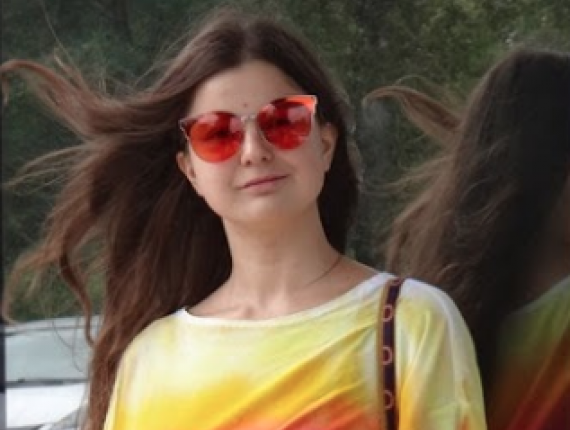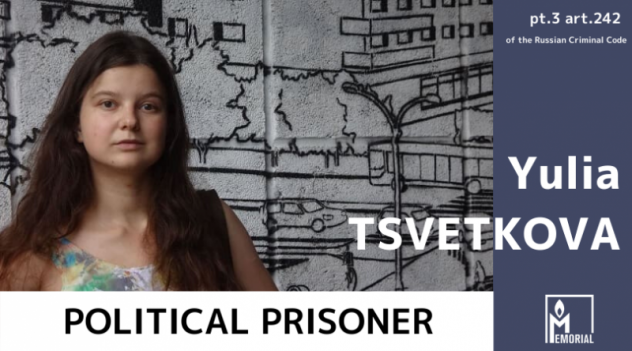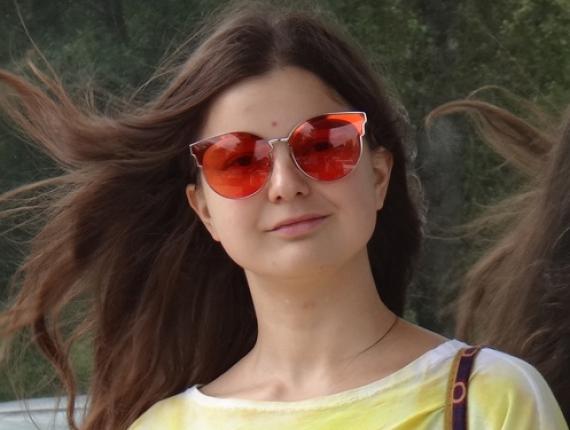Feminist artist Yulia Tsvetkova is a political prisoner, Memorial says
Yulia Tsvetkova is being prosecuted for her public stance and feminist views
Feminist artist Yulia Tsvetkova, who lives in Komsomolsk-on-Amur, has been charged with unlawful preparation and trafficking of pornographic materials on the Internet (Point b of Part 3 of Article 242 of the Russian Criminal Code, punishable by up to six years’ deprivation of liberty). The charges are based on her role as administrator of a feminist body-positive online page, ‘Vagina Monologues,’ which has published abstract depictions of female sexual organs and items similar to those either drawn by Tsvetkova or posted earlier on the Internet with the aim of removing the taboo surrounding female physiology. Since 23 November 2019 Tsvetkova has been under house arrest. The criminal investigation was initiated following a complaint by homophobic activist Timur Bulatov, who has a criminal record. Bulatov, according to statements he has made, is conducting a ‘moral jihad’ against LGBT people, and those who treat them with tolerance, by making complaints to law enforcement agencies.
We consider Yulia Tsvetkova is being prosecuted under the criminal law for her public activities and her active feminist stance. She promotes her views by wholly lawful means as an activist and contemporary artist. At the same time, her prosecution is taking place in the context of a government campaign for the ‘protection of traditional values,’ used, among other things, to secure the regime’s hold on political power in Russia. The criminal prosecution of Tsvetkova was preceded by an intimidation campaign against the artist and her mother and an extended examination (from February until November 2019) by law enforcement authorities of all her online and offline projects. Taken together, these bear witness to the artificially contrived nature of the offence with which she has been charged and the evident fact that the prosecution is politically motivated.
Materials in connection with which Tsvetkova has been charged cannot be regarded as pornographic. They do not incite sexual desire, are not naturalistic and have a specific artistic and intellectual value. In both our view and that of experts who have examined the works, these materials are no more pornographic than the depiction of sexual organs in a school anatomy textbook. The materials cannot be automatically classified as ‘pornographic’ because of the depiction of vaginas. In the world of art and design of the 19th, 20th and 21st centuries there are numerous examples of such depictions of an important cultural value.
The criminal prosecution of Tsvetkova is all the more selective, given the large amount of significantly more candid and naturalistic materials on the Internet that have not been subject to criminal investigations. The very suggestion that someone could perceive the drawings posted by Tsvetkova as pornography is absurd in today’s realities. Similarly, the crude interference of law enforcement agencies in creative matters and attempts to criminalise contemporary art, placing the function of art experts on police investigators, is absurdly anachronistic.
The Memorial Human Rights Centre, in line with international guidelines defining the term, recognises Yulia Tsvetkova as a political prisoner. We urge that the absurd charges concerning alleged distribution of pornography be dropped and that the activist be immediately released from house arrest.
Recognition of an individual as a political prisoner, or of a prosecution as politically motivated, does not imply that the Memorial Human Rights Centre shares or approves the individual’s views, statements or actions.
- The best source of news about the case and the solidarity campaign, including the timetable for pickets in support of Tsvetkova, is the Telegram channel ‘Я/Мы Юлия Цветкова.’
- You can sign the petition in support of Yulia Tsvetkova.
- You can support all political prisoners by donating to the Fund to Support Political Prisoners of the Union of Solidarity with Political Prisoners via PayPal, using the e-wallet at helppoliticalprisoners@gmail.com.
- The address for letters is: 111399, Москва, Мартеновская ул., д. 3, а/я 6 [111399, Moscow, Martenovskaya Street, House 3, PO Box 6] (letters will be passed on to Yulia Tsvetkova’s mother).




